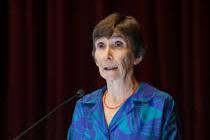MRC Speaker Series: Linguistic Diversity, Sustainable Development and the Economics of Language Policy (Suzanne Romaine)
Linguistic Diversity, Sustainable Development and the Economics of Language Policy
Linguists and language activists find it difficult to win public support for preserving linguistic diversity and revitalizing endangered languages. Many remain unconvinced by the reasons linguists typically offer for valuing language diversity. One set of arguments focuses on the potential loss of traditional ecological knowledge and cultural heritage encoded in language, while another invokes a rights-based discourse, often anchored in a distributive and social justice framework. Although all of these have an important role to play, the economic significance and consequences of the global loss of linguistic diversity have not yet been seriously studied or appreciated. I will argue that a convincing case for supporting linguistic diversity may be made not on the basis of political arguments of appeal to human or minority rights, but rather on the basis of economic welfare theory, by taking account of some specific features of diverse linguistic environments as a valuable commodity. SpecificallyLinguists and language activists find it difficult to win public support for preserving linguistic diversity and revitalizing endangered languages. Many remain unconvinced by the reasons linguists typically offer for valuing language diversity. One set of arguments focuses on the potential loss of traditional ecological knowledge and cultural heritage encoded in language, while another invokes a rights-based discourse, often anchored in a distributive and social justice framework. Although all of these have an important role to play, the economic significance and consequences of the global loss of linguistic diversity have not yet been seriously studied or appreciated. I will argue that a convincing case for supporting linguistic diversity may be made not on the basis of political arguments of appeal to human or minority rights, but rather on the basis of economic welfare theory, by taking account of some specific features of diverse linguistic environments as a valuable commodity. Specifically, I will show why the health of a language depends on the health of its speakers, which in turn depends on the health of the natural environment. Specifically, I will show why the health of a language depends on the health of its speakers, which in turn depends on the health of the natural environment.
Suzanne Romaine is Marie Curie Fellow of the European Union and Senior Fellow at FRIAS (Freiburg Institute for Advanced Studies), University of Freiburg. From 1984 to 2014 she was Merton Professor of English Language at the University of Oxford. She has received honorary doctorates from the University of Uppsala and the University of Tromsø and has held a variety of scholarships and visiting fellowships at other universities including the Rotary International Foundation fellowship, the Canada Commonwealth Scholarship, Kerstin Hesselgren Professor for outstanding women in the Humanities, and the Royden B. Davis Chair in Interdisciplinary Studies at Georgetown University. She was a resident fellow at the Center for Advanced Studies in the Behavioral Sciences at Stanford and was elected Fellow of the Finnish Academy of Science and Letters and the Norwegian Academy of Science and Letters. She has published numerous books and articles on linguistic diversity, multilingualism, language death, language revitalization, language change and contact. She was a member of the Expert Group that produced UNESCO’s position paper on Education in a Multilingual World (Paris, 2003), and wrote the backgrounder paper on Languages and Cultural Identities for UNESCO’s report Investing in Cultural Diversity and Intercultural Dialogue (Paris, 2009). Her most recent book is Linguistic diversity in high biodiversity regions (2014, Conservation International, jointly with L.J. Gorenflo).









